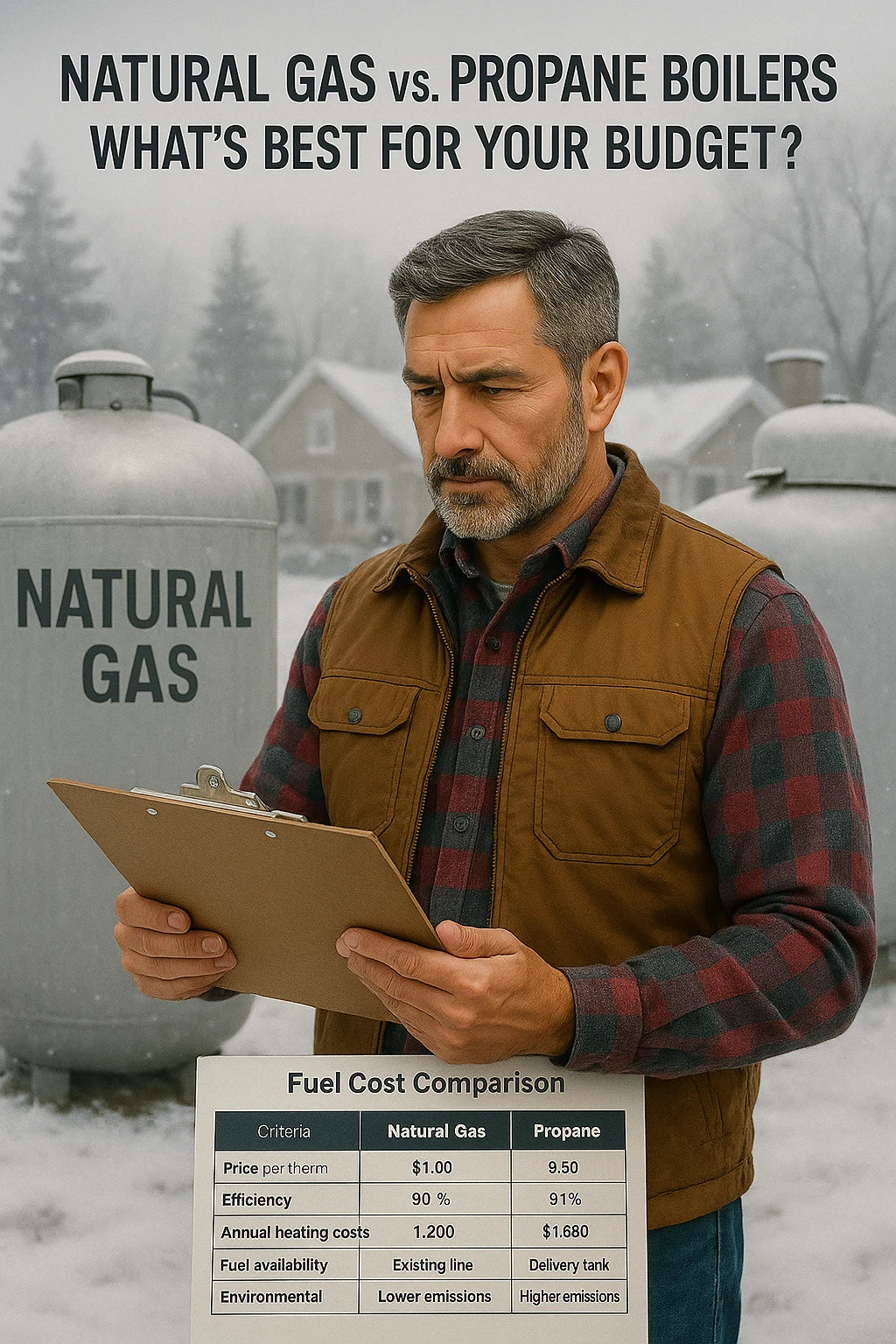For Mike Sanders—and any homeowner weighing boiler fuel types—the natural gas vs. propane debate boils down to three big factors: availability, affordability, and compatibility. This guide walks through each of those dimensions with real data, regional examples, and practical comparisons to help you determine what works best for your home, boiler, and long-term budget.
⛽ 1. What’s the Difference Between Natural Gas and Propane?
| Feature | Natural Gas | Propane |
|---|---|---|
| Energy Content | 1,030 BTU/cubic foot | 91,500 BTU/gallon |
| Supply Method | Utility pipeline | Delivered by truck, stored in onsite tank |
| Cost (2025 est.) | $1.30–$1.60/therm | $2.50–$3.80/gallon |
| Carbon Intensity | Lower CO₂ per BTU | Slightly higher CO₂ per BTU |
| Availability | Widespread in urban/suburban areas | Common in rural or off-grid areas |
➡️ Bottom line: Natural gas is cheaper and more convenient in urban areas. Propane is often the only option in rural zones.
Propane Education & Research Council
🏘️ 2. Fuel Availability by Region
📍 Urban/Suburban (e.g., Ohio, Pennsylvania, Illinois)
-
Natural gas is piped in via utility mains
-
Installation is simpler (no tank to manage)
-
Monthly utility billing adds convenience
🌲 Rural (e.g., Vermont, Montana, Idaho)
-
No gas main = propane-only access
-
Onsite tank (owned or leased)
-
Seasonal delivery requires fuel planning
➡️ Mike’s tip: Check if your address has access to a gas main using your local utility’s online lookup tool.
💸 3. Fuel Cost Comparison: Therms vs. Gallons
Example: Heating a 2,000 sq. ft. home for winter
| Fuel Type | Annual Usage | Average Price (2025) | Annual Fuel Cost |
| Natural Gas | 800 therms | $1.40/therm | $1,120 |
| Propane | 900 gallons | $3.20/gallon | $2,880 |
➡️ Natural gas saves ~$1,700/year for the average midwestern home.
🔄 4. Converting from Natural Gas to Propane (or Vice Versa)
🔧 What You’ll Need:
-
Conversion kit for the boiler (available for the CGA-4)
-
Regulator and orifice changes
-
Pressure test and calibration
-
Licensed technician for fuel line modifications
Weil-McLain CGA-4 Installation Manual
Conversion Kit Cost: $200–$450
Labor Cost: $500–$1,200 depending on region and piping complexity
➡️ Mike’s rule: Only switch fuels if local gas just became available, or propane prices have surged.
♻️ 5. Environmental Impact: Which Fuel Burns Cleaner?
-
Natural Gas: Lower carbon intensity per BTU
-
Propane: Cleaner than oil, emits slightly more CO₂ than NG
-
Both: Low particulate emissions and low sulfur content
➡️ In states with clean-energy incentives, natural gas may qualify for cleaner heating credits.
⚖️ 6. Boiler Compatibility: Can the CGA-4 Use Both Fuels?
Yes—the Weil-McLain CGA-4 Series 3 is a dual-fuel capable boiler with an optional propane conversion kit. That means:
-
You can install it with NG now and convert later
-
It maintains the same 84% AFUE rating with either fuel
-
No performance degradation between fuels when properly tuned
➡️ Mike doesn’t have to change the entire system—just the fuel kit.
Weil-McLain Fuel Conversion Guide
🧠 7. Mike’s Decision Matrix: NG vs. Propane
| Situation | Best Choice | Why? |
| Urban home with gas line access | Natural Gas | Lowest fuel cost + simple billing |
| Rural home with tank already installed | Propane | No infrastructure change needed |
| New construction in rural location | Propane (initially) | Upgrade later if NG comes to town |
| NG prices spike, propane drops | Propane (convert) | Short-term cost savings if tank ready |
🧮 8. Tools to Estimate Your Fuel Costs
✅ Conclusion: What’s Best for Mike?
If Mike Sanders lives in a gas-served neighborhood, natural gas is the obvious choice—more affordable, easier to maintain, and more environmentally efficient. But in a rural setting or transitional zone, propane offers dependable, flexible heating—especially if a gas main isn’t available.
With the dual-fuel CGA-4 boiler from Weil-McLain, Mike has the flexibility to choose the right fuel now—and adapt later without overhauling his whole system.
In the next topic we will know more about: Top Maintenance Tips to Extend the Life of Your Weil-McLain CGA-4 Boiler







